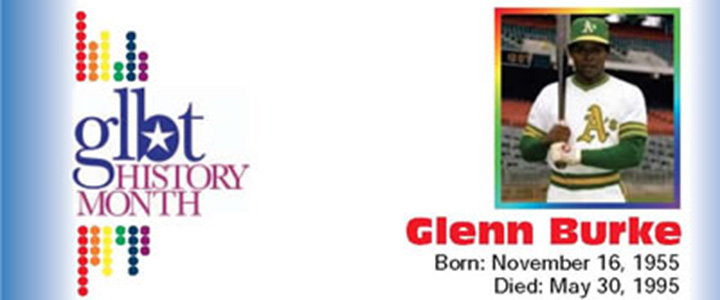
“They can’t ever say now that a gay man can’t play in the majors, because I’m a gay man and I made it.”

Glenn Burke
Born: November 16, 1955
Died: May 30, 1995
“They can’t ever say now that a gay man can’t play in the majors, because I’m a gay man and I made it.”
Is first always best? Sometimes it’s the hardest, especially for gays in the world of Sports. Even in 2012, there are very few out sports stars. However, in the early 1980’s Glenn Burke paved the way in Major League Baseball, but his is a cautionary tale. Despite becoming the first player to come out to his managers and teammates, his life was hardly a box of “peanuts and crackerjacks.”
Burke was born in California and excelled in several sports while attending Berkeley High School. Before his professional baseball career, he went to the University of Nevada on a basketball scholarship. He didn’t shoot hoops in Reno for long before he was drafted by the LA Dodgers and after a few years in the minor leagues, he made is major league debut in 1976.
Glenn Burke is really best known as the inventor of the high five. (Who knew the high five was gay?) In October of 1977, Burke’s teammate, Dusty Baker, hit his 30th homerun of the season. As he reached home plate, Burke greeted him with what is credited as the first documented high five. Baker later said “His hand was up in the air, and he was arching way back so I reached up and hit his hand. It seemed like the thing to do.” The rest, as they say, is (gay) history.
After confessing his homosexuality to his team and befriending the estranged gay son of baseball coaching legend and Los Angeles Dodgers coach, Tony Lasorda, Burke was traded to the Oakland Athletics. Many, including Burke and his teammates, thought that he was traded because he was a gay man. In Oakland, he didn’t see much playing time and was injured before the season started. Consequently, he was moved back down to the minor leagues in Utah. They eventually “released” him from his contract, ending his professional baseball career in 1979.
In a 1982 article in Inside Sports, Burke officially came out of the closet in public. He went on to compete in the “Gay Games” in the early 1980’s and he won several medals. However, he never returned to professional sports and said in his 1994 biography “Prejudice drove me out of baseball sooner than I should have. But I wasn’t changing, my mission as a gay ballplayer was to break a stereotype . . . I think it worked.”
Sadly, in 1987, he was hit by a car in San Francisco crushing his foot and leg. After the accident, his life took a turn for the worse. He battled a cocaine addiction that eventually cost him his fortune. At one point he was arrested for drugs, and was living homeless on the streets of San Francisco. In 1994 he announced he had contracted HIV and died of AIDS related caused the next year. In the years since Burke broke the gay professional athlete stereotype, surprisingly few pros have followed him out of the closet. Surely, that’s bound to change in the next few years. As more and more people come out of the closet, hopefully professional athletes will follow suit. Hopefully…














